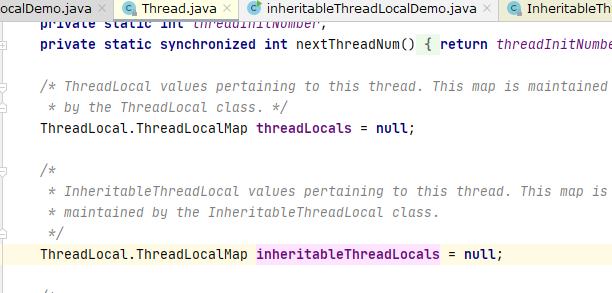InheritableThreadLocal原理解析
Posted cj_eryue
tags:
篇首语:本文由小常识网(cha138.com)小编为大家整理,主要介绍了InheritableThreadLocal原理解析相关的知识,希望对你有一定的参考价值。
在项目上使用ThreadLocal的时候我们一般都会如下这般,这个InheritableThreadLocal 是什么呢?
package com.cjian.threadlocal;
import java.util.Collections;
import java.util.HashMap;
import java.util.Locale;
import java.util.Map;
/**
* @description:
* @author: CJ
* @time: 2021/5/13 14:00
*/
public class ThreadLocalUtils {
private static ThreadLocal<Map<String, Object>> threadLocalMap;
static {
threadLocalMap = new InheritableThreadLocal<Map<String, Object>>() {
protected Map<String, Object> initialValue() {
return Collections.synchronizedMap(new HashMap());
}
protected Map<String, Object> childValue(Map<String, Object> parentValue) {
return Collections.synchronizedMap(new HashMap(parentValue));
}
};
}
public static Map<String, Object> getThreadLocals() {
return (Map) threadLocalMap.get();
}
public static Object getThreadLocalByKey(String key) {
Object value = ((Map) threadLocalMap.get()).get(key);
return value;
}
public static void addThreadLocal(String key, Object value) {
if (key != null) {
((Map) threadLocalMap.get()).put(key, value);
}
}
public static Object removeThreadLocal(String key) {
return key == null ? null : ((Map) threadLocalMap.get()).remove(key);
}
public static void clearThreadLocals() {
((Map) threadLocalMap.get()).clear();
}
}
我们先来看个demo:
package com.cjian.threadlocal;
/**
* @description:
* @author: CJ
* @time: 2021/6/1 10:39
*/
public class inheritableThreadLocalDemo {
public static ThreadLocal<String> threadLocal = new ThreadLocal<>();
public static InheritableThreadLocal<String> inheritableThreadLocal = new InheritableThreadLocal<>();
public static void main(String[] args) {
method1();
method2();
}
private static void method2() {
// main 线程 set
inheritableThreadLocal.set(Thread.currentThread().getName()+"2 set value");
new Thread(()-> {
// 子线程 t1 get
System.out.println(Thread.currentThread().getName()+" get value:" +inheritableThreadLocal.get() );
},"子线程2").start();
// main 线程get
System.out.println(Thread.currentThread().getName()+"2 get value:" +inheritableThreadLocal.get() );
}
private static void method1() {
// main线程 set value
threadLocal.set(Thread.currentThread().getName() + "1 set value");
new Thread(() -> {
// 子线程 get
System.out.println(Thread.currentThread().getName() + " get value:" + threadLocal.get());
}, "子线程1").start();
//main 线程 get
System.out.println(Thread.currentThread().getName() + "1 get value:" + threadLocal.get());
}
}
运行结果为:
main1 get value:main1 set value
子线程1 get value:null
main2 get value:main2 set value
子线程2 get value:main2 set value通过代码可以看出,method1中通过main线程往ThreadLocal中设置了一个值,main线程可以成功拿到该值,但是另起的一个子线程1却拿不到;
method2中我们使用InheritableThreadLocal却可以成功拿到,这说明 InheritableThreadLocal 具有继承性。接下来InheritableThreadLocal 是怎么实现的!
package java.lang;
import java.lang.ref.*;
public class InheritableThreadLocal<T> extends ThreadLocal<T> {
protected T childValue(T parentValue) {
return parentValue;
}
ThreadLocalMap getMap(Thread t) {
return t.inheritableThreadLocals;
}
void createMap(Thread t, T firstValue) {
t.inheritableThreadLocals = new ThreadLocalMap(this, firstValue);
}
}
我们看到InheritableThreadLocal 继承了 ThreadLocal 类。并且重写了父类的 createMap,getMap ,childValue三个方法。
在createMap 和getMap 方法中我们可以看到,将ThreadLocal 方法中的线程threadLocals 属性换成了 inheritableThreadLocals 属性。
我们可以看下Thread类中的这成员定义

到底它是怎么继承父线程属性的呢?这时候我们要从线程的创建开始分析了,看下线程Thread类的构造方法:
public Thread(Runnable target) {
init(null, target, "Thread-" + nextThreadNum(), 0);
}
private void init(ThreadGroup g, Runnable target, String name,
long stackSize) {
init(g, target, name, stackSize, null, true);
}
private void init(ThreadGroup g, Runnable target, String name,
long stackSize, AccessControlContext acc,
boolean inheritThreadLocals) {
if (name == null) {
throw new NullPointerException("name cannot be null");
}
this.name = name;
//获取父线程
Thread parent = currentThread();
SecurityManager security = System.getSecurityManager();
if (g == null) {
/* Determine if it's an applet or not */
/* If there is a security manager, ask the security manager
what to do. */
if (security != null) {
g = security.getThreadGroup();
}
/* If the security doesn't have a strong opinion of the matter
use the parent thread group. */
if (g == null) {
g = parent.getThreadGroup();
}
}
/* checkAccess regardless of whether or not threadgroup is
explicitly passed in. */
g.checkAccess();
/*
* Do we have the required permissions?
*/
if (security != null) {
if (isCCLOverridden(getClass())) {
security.checkPermission(SUBCLASS_IMPLEMENTATION_PERMISSION);
}
}
g.addUnstarted();
this.group = g;
this.daemon = parent.isDaemon();
this.priority = parent.getPriority();
if (security == null || isCCLOverridden(parent.getClass()))
this.contextClassLoader = parent.getContextClassLoader();
else
this.contextClassLoader = parent.contextClassLoader;
this.inheritedAccessControlContext =
acc != null ? acc : AccessController.getContext();
this.target = target;
setPriority(priority);
//通过调用ThreadLocal 的静态方法createInheritedMap 将父线程的 inheritableThreadLocals 属性作为参数去创建 ThreadLocalMap 对象并赋值给自己
if (inheritThreadLocals && parent.inheritableThreadLocals != null)
this.inheritableThreadLocals =
ThreadLocal.createInheritedMap(parent.inheritableThreadLocals);
/* Stash the specified stack size in case the VM cares */
this.stackSize = stackSize;
/* Set thread ID */
tid = nextThreadID();
}
//参数值为parent.inheritableThreadLocals
static ThreadLocalMap createInheritedMap(ThreadLocalMap parentMap) {
return new ThreadLocalMap(parentMap);
}
private ThreadLocalMap(ThreadLocalMap parentMap) {
//parentMap = parent.inheritableThreadLocals
Entry[] parentTable = parentMap.table;
int len = parentTable.length;
setThreshold(len);
table = new Entry[len];
//通过遍历父类的ThreadLocalMap 对象然后赋值到自己的table 中的
for (int j = 0; j < len; j++) {
//取出父线程中ThreadLocal里面j下标的Entry 值
Entry e = parentTable[j];
if (e != null) {
@SuppressWarnings("unchecked")
ThreadLocal<Object> key = (ThreadLocal<Object>) e.get();
if (key != null) {
//调用的是inheritablethreadlocal重写后的childValue方法,可以对继承的值进行加工
Object value = key.childValue(e.value);
Entry c = new Entry(key, value);
//计算下标
int h = key.threadLocalHashCode & (len - 1);
while (table[h] != null)
h = nextIndex(h, len);
//赋值
table[h] = c;
size++;
}
}
}
}
分析完毕~
以上是关于InheritableThreadLocal原理解析的主要内容,如果未能解决你的问题,请参考以下文章